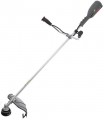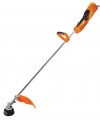Trimmer blade width
The width (diameter) of the trimmer knife characterizes the size of the paddle knife (or saw blade). Such a nozzle has a smaller capture width than a fishing line, however, it allows you to mow more dense thickets, including shrubs.
Handle type
The type of handle provided in the design of the trimmer or combisystem (see "Type").
The choice for this parameter depends primarily on the personal preferences of the user, however, there are also quite objective differences between different types. The types themselves can be:
—
Bicycle. A handle in the form of a pair of characteristic "horns" on either side of the trimmer bar, reminiscent, in accordance with the name, of a bicycle handlebar. This design allows you to comfortably mow the grass and perform other similar work; it is good in that the user's hands are in the most natural position when holding the tool. In addition, we note that the handles are convenient for both right-handers and left-handers. The disadvantage of models with bicycle handles is the relatively large weight and dimensions, as well as poor suitability for cutting branches and other work "at height". However, in the case of trimmers, such a need arises extremely rarely (especially since there are specialized varieties of garden tools for this — brush cutters and pole saws). Therefore, it is this option that has received the greatest popularity in modern trimmers.
—
Loop -shaped. The handle, which looks like a characteristic loop, usually in the shape of the letter D. The role of the second handle in such a tool is usually played by the back of the bar, and the trimmer controls are also located there.
...In general, this design is considered less convenient than a bicycle one: the user has to either hold the tool with the barbell to the side, or pull one hand back strongly. On the other hand, the loop-shaped handle gives good vertical manoeuvrability and allows you to work both at ground level and much higher, and you can easily change the height of the nozzle. As a result of all this, although this option is less popular than the “bike”, it is still quite common, mainly on relatively light and low-power trimmers.Motor power
Lawnmower engine power expressed in watts. This designation is used absolutely for all electric models (see "Engine type"), and it is also often found in gasoline and diesel units along with horsepower (these units are clearly related, 1 hp is about 735 watts).
In general, the more powerful the engine, the more performant the mower and the better it will cope with heavy work such as cutting thick grass, bushes, etc. On the other hand, high power has a corresponding effect on fuel / electricity consumption, as well as the weight and price of the engine. In addition, note that the power requirements depend on the type of mower itself and its engine (see above for both). For example, for most
robots, the power
does not exceed 500 W — more, taking into account specialization, is not required, besides, otherwise the devices would turn out to be too bulky and heavy. Trimmers and lawn mowers of similar power are only electric, and the power limit for power tools is
2500 – 3000 W when powered from the mains and
1500 – 2000 W for battery models. But in gasoline tools, the minimum power is about
500 – 1000 W for trimmers and
1000 – 1500 W for mowers; the maximum value can exceed
4 kW.
Detailed recommendations for choosing a lawn mower d
...epending on its type and features of the planned work can be found in special sources.Soft start
The presence of a
soft start system in the lawn mower engine.
The design features of electric motors are such that when power is applied directly, the start occurs very abruptly — both in a mechanical and electrical sense. Firstly, the engine itself spins up in a jerk, in a very short time, which increases the wear of its parts. Secondly, at the moment of start-up, there is a sharp jump in current strength, which creates significant loads on the power grid (or the batteries of the unit). The soft start system eliminates these phenomena: it limits the starting current, allowing the motor to accelerate smoothly and preventing voltage surges.
On the other hand, additional electronic circuits affect the cost, sometimes quite significantly. So there are few models with this feature nowadays, and you should pay attention to them mainly in cases where the mentioned advantages are of fundamental importance — for example, if the device is purchased for a house with weak wiring that does not tolerate voltage surges.
Noise level
The level of noise produced by the device during operation. Usually, a certain average indicator is indicated in the characteristics — in the standard mode of operation; however, the actual values usually do not differ much from the claimed ones.
The lower the noise level, the more convenient the unit to use and the less tired the operator. In the case of lawn mowers, this is especially true, since such equipment is quite noisy — even the quietest models (some robots) give out about 47 – 48 dB, which is comparable to talking at an average volume. Note that the decibel is a non-linear quantity, and it is easiest to evaluate the actual loudness using comparative tables. Here is the simplest table for the values found in modern lawn mowers:
— 60 – 65 dB — talking in raised tones at a distance of about 1 m;
70 dB — loud conversation of several people at the same distance;
75 dB — loud laughter at a distance of 1 m;
80 dB — motorcycle engine, medium power vacuum cleaner.
90 dB — loud screams, freight car at a distance of 7 – 10 m;
100 dB — a subway train or a loud car signal at a distance of 5 – 7 m, an industrial workshop;
110 dB — tractor engine at a distance of about 1 m.
In addition to subjective sensations, there are specific sanitary standards that limit the impact of strong noise. So, according to European standards, noise of 85 dB is allowed to be heard without protective equipment for 8 hours, 91 dB — 2 hours, 97...dB — half an hour, and 103 dB — only 7 minutes. So when choosing a unit, you should take into account the duration of work with it — with high noise, you may need protective headphones.

